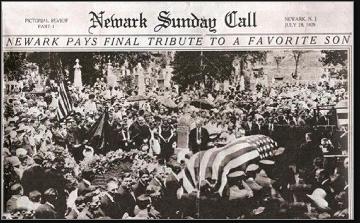
Sport: Baseball
Born: October 12, 1892
Died: July 20, 1929
Town: Newark, New Jersey
Rupert Frank Mills was born October 20, 1892, in Newark, NJ. Known to his friends as “Rupe,” he was tall, personable, intelligent and an athlete of considerable grace and power. He was a legend at Barringer High School, where he led the baseball and football teams to glory. He decided to attend Notre Dame in 1911, where he could continue his athletic career and also study law.
At Notre Dame, Rupe befriended Knute Rockne, a receiver on the football team. He also was a classmate of four-sport star Dutch Bergman, who became the first athlete to earn varsity letters in four sports at the school. Rupe became the second in 1914–15, starting in centerfield (for three seasons), as well as playing for the football, basketball and track teams. Johnny Lujack and George Ratterman matched this feat in the 1940s and no one has done so since. Rupe, who won a total of nine varsity letters, was also active in the performing arts and was voted the president of the Senior Law Class.
After graduation in 1915, Rupe was wooed by several professional baseball clubs. The hometown Newark Peppers of the renegade Federal League made him the best offer: two years guaranteed at $3,000 a year. The only New Jerseyan on the team, he served as the back-up first baseman to Emil Huhn, seeing action in 41 games.
The Federal League suspended play prior to the 1916 season. The Peppers bought out the contracts of their players and then sold them off to various major and minor league teams. Rather than playing for a bush-league salary, Rupe decided to maintain his $3,000 paycheck by fulfilling the terms of his contract. He showed up in uniform at Harrison Field each morning and playing a simulated game by himself.
“The other day I wrenched my ankle while sliding and I had to put myself in to run for me,” he told a local reporter, complaining that he had “a dickens of a time trying to pull a double steal.”
The Peppers were owned by oil magnate Harry Sinclair, who usually came out on top in employee disputes. Not this time. The Peppers realized they were beaten and made Rupe a generous offer to end the charade. He played out the year in the minors and signed with the Denver Bears in 1917. Rupe was one of the league’s better hitters but, with America’s entry into World War I, he put his sports career aside and enlisted in the army. Rupe served as a captain in an artillery unit and saw action in France.
Upon his return, Rupe began his law career, but continued to play baseball for fun in local leagues. He also became a good polo player. And he was a de facto scout for Notre Dame; whenever he spotted a promising athlete, he wired Rockne to tip him off.
During the 1920s, Rupe was elected to the State Senate and also served as Under Sherriff of Essex County. In the summer of 1929, while spending time at Lake Hopatcong, he convinced a political acquaintance, Louis Freeman, to go canoeing with him. Freeman could not swim, but Rupe assured him he had the requisite lifesaving skills should there be a mishap. Besides, Freeman would be wearing a life preserver. Somehow the canoe overturned and Rupe had to tow his friend to shore.

Then, without warning, Rupe slipped quietly below the surface and drowned. Doctors believed he had suffered a heart attack. He was just 35. Rupe’s funeral drew more than 20,000 mourners. The service was held at St. Augustine’s on Sussex Avenue in Newark. Hundreds of soldiers, policemen and firemen were part of the procession.